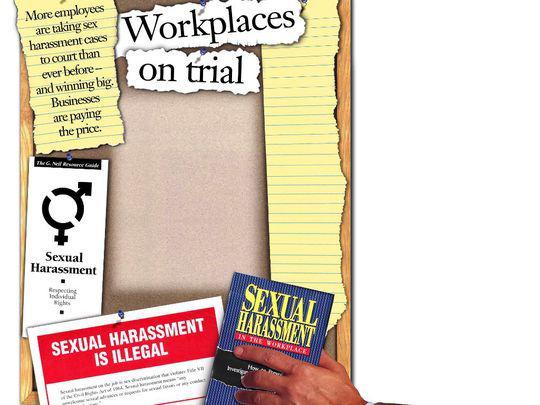|
5 things HR managers say about sexual harassment in #MeToo era
By Kristen Jordan Shamus
[with video] The steamroller of sexual assault and harassment claims have left no industry untouched in the #MeToo era. Allegations of sexual misconduct took down media giant Matt Lauer, Hollywood mogul Harvey Weinstein and dozens of others. In Detroit last week, WXYZ-TV anchor Malcom Maddox was temporarily taken off the air when his former colleague Tara Edwards sued the station in federal court, seeking $100 million in a civil rights case claiming years of harassment. Edwards said it's the stories of others who've been empowered to talk about sexual harassment and abuse in the workplace that gave her "the courage to speak out. ... I used to think no one would ever believe my story." The societal crescendo of truth telling has had another kind of ripple effect. It's given a boost to human resources companies that investigate claims of sexual harassment and offer training to workers and their bosses about what is and what isn't appropriate behavior. "This is an important movement that is happening right now, and it is serious," said Kristen Baker, vice president of Detroit-based HR Advantage Advisory. "From any company's perspective, the need for training and proper reporting protocol is critical, not only to protect yourself but to educate employees and supervisors." She said her company has seen a 60% to 75% uptick in the number of requests for online or in-person anti-sexual harassment training in the months since news of the Weinstein scandal broke, as well as companies requesting help from an outside entity to conduct independent sexual harassment investigations. "Perceptions are changing," Baker said. "I think the #MeToo movement and a lot of what we’re hearing now has given people courage to come forward but also in some cases has given credence to people who have come forward in the past." Jill Hannigan, vice president of human resources at Farmington Hills-based AccessPoint, agreed, noting her company also has seen a rising demand for training and consultations in recent months. "We have a lot of our clients right now starting to inquire about what they should and shouldn’t be doing," Hannigan said. "One of our presidents of a company has a lot of female executives on his team. He is very nervous about conducting meetings alone with any of them. "He is looking for options about what he should do to protect himself. He knows he’s not going to do anything wrong, but what he’s concerned about are false allegations." Baker and Hannigan offer this expert advice to companies and workers who are concerned about how doing business in the climate of #MeToo can affect them: 1.) Take complaints seriously and investigateIt's important for employees of any company to speak up any time they feel harassed, Hannigan said, but it's just as important for the company to respond immediately. "A company should — regardless of how long ago it was — launch into a formal investigation, which would be obtaining written statements and documents from the individuals involved in the specific situation, whether there were witnesses present or anyone who overheard or saw anything," Hannigan said. "Until you’re able to obtain all that information, you’re really not able to determine if there truly was harassment involved or not." The spotlight is shining most brightly now on famous women's claims against male colleagues, but Baker said men can be sexually harassed, too, and are not to be dismissed. "It’s not only women that feel they are being harassed or have been in a situation where they feel uncomfortable," she said. "We have had men as well and I’ve been involved in investigations of those. We need to make sure that whomever is bringing these claims forward, that we’re treating them seriously and are investigating. "I give a lot of kudos to those who do come forward, and are brave enough to do that." 2.) Establish an anti-harassment policyCompanies must outline clearly what is and isn't considered sexual harassment and ensure that information is given to employees, Hannigan said. "The most important thing we’re really trying to address with our clients today is making sure that they have an anti-harassment policy in place and it’s up to speed," Hannigan said. "It’s outlining what is considered harassment, what steps need to be taken if an employee files a harassment claim, processes, procedures, and outlining that an investigation will be conducted and that most importantly, there will be no retaliation against the employee who is bringing up the behavior to the employer." Harassment can take many forms. It could be standing too close to a coworker, touching another person, making lewd or suggestive jokes, sending sexual text messages or posts on social media, having a pinup on your desk or an inappropriate photo of a romantic partner. But the key hallmark of harassment, Baker said, is that it is always an unwanted interaction. "It could be unwanted physical or unwanted verbal interaction in which somebody feels uncomfortable," Baker said. "I always tell people that the first thing you need to do is to tell the person to stop," Baker said. "That is one thing that you want do is to make clear is that that behavior is not OK with you. And there are different degrees. For example, if somebody made a comment to me, 'Oh, Kristin, you look nice today. I like what you’re wearing today.' I may appreciate that. Someone else may not. "If something is happening that you’re not comfortable with, you need to tell the person you’re not comfortable and ask them to stop. If the behavior continues, and you’re still uncomfortable, it’s at that point where you need to report it. "What might be OK for me in my interaction with you might not be OK with somebody else." Sometimes, Baker said, there are cases where coworkers were involved in a romantic relationship that went sour. During an investigation of a claim in a situation like that, Baker said, "I really have to look at the broad perspective of what’s the relationship between two people and what specifically has happened … to understand the true dynamic behind it." Having a solid sexual harassment policy in place can help companies in court, should a sexual harassment case make its way into the legal system. "A judge is going to want to see what the employer had in place," Hannigan said. "Companies should have a definite policy in place that outlines procedures ... to protect the employer ... in a legal battle." 3.) Get training, rinse, repeatOnce a company has established a policy, Hannigan and Baker say regular training about that policy is vital. "We recommend annual trainings," Hannigan said, "and if there is any filing of a harassment claim of any sort, and an investigation is conducted, part of the resolution coming out of that investigation is a formal training for that staff again." The training can be done during in-person meetings with the staff or remotely through training videos, online courses or PowerPoint presentations. "It’s mainly just outlining what the appropriate and inappropriate behaviors are in the workplace and then also the steps the employee needs to take if they’re feeling that they’re harassed and then what the process will be from there," Hannigan said. Managers and supervisors need to understand how their roles as leaders within a company carry greater responsibility to report anything that seems out of line, Baker said. "From a supervisory or leadership perspective, what is their obligation? It is if you see something, say something," she said. 4.) Establish a reporting protocolOutlined in any good sexual harassment policy is a procedure about how to report it, Baker said. "In some cases it would be to report to the supervisor. If the person is uncomfortable going to the supervisor, then they could go to HR," she said. "We have a lot of companies now that are requesting hotlines, an ethics or a reporting hotline, where if you are uncomfortable talking to anybody about what’s happening, you can call the hotline. We manage a lot of these for clients and we’ve seen an uptick of those as well." The company's reporting protocol should be included in employee handbooks and referenced in regular training. 5.) Use the Grandma Test In this climate of heightened climate of awareness, anyone concerned about whether his or her behavior at work is appropriate can try what Hannigan calls the Grandma Test. "The biggest thing that people have to realize is the perception," she said. "You might think your actions are fine and OK, but that might not be how the other individual is perceiving it. And that’s all it’s going to take for them to feel comfortable or uncomfortable. "You have to be mindful of your actions. Would you act or speak to your grandmother in that fashion? If not, you probably shouldn’t be doing it to your coworker." As for that company president Hannigan said was concerned that false allegations of harassment could come from private meetings with female executives, Hannigan said he can try to have his meetings in an open forum, ask a third party to sit in on the meetings or, with the other person's permission, record the meetings. "That’s not going to protect him fully because somebody could try to claim he was touchy-feely, but it would at least minimize any type of verbal harassment that could possibly take place," she said. Contact: kshamus@freepress.com
|
.
Any original material on these pages is copyright © BishopAccountability.org 2004. Reproduce freely with attribution.




